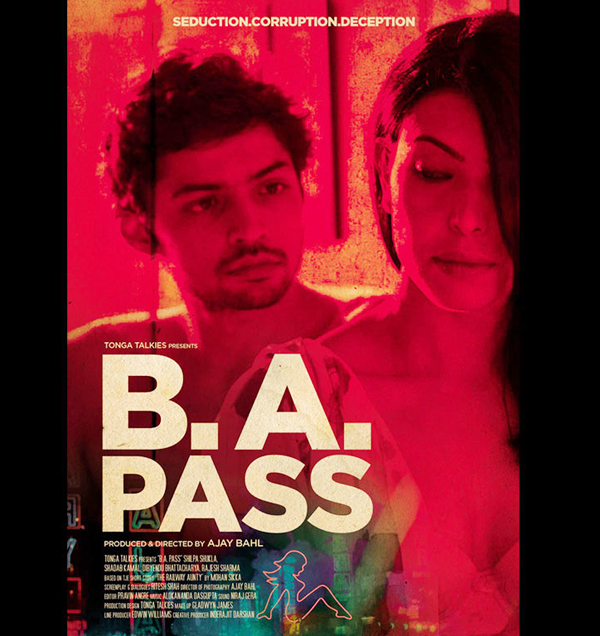Trisha Gupta
Ajay Bahl’s debut film is a treat. Bahl has taken Mohan Sikka’s spare, salacious short story from the 2009 anthology Delhi Noir and filled out its silences just so, creating a film that somehow fulfills our expectations from noir – shadowy urban spaces, a femme fatale whose allure is tied to a deliberate air of mystery, a doomed male protagonist entwined in an ever-tightening plot – while also taking us beyond them.
The tale of how the orphaned, college-going Mukesh (Shadaab Kamal, making an absolutely stellar debut) is entrapped by sultry older woman Sarika (Shilpa Shukla, brazenly sexual in a deliberately stylised performance) is most certainly noir, but it showcases none of the regular Bollywood pitstops on the urban darkness tour.
There is no lowlife dance bar, no small-time gambling den, no grimy brothel reeking of desperation. Instead it reserves much of its screen-time for seemingly innocuous spaces: the faded ennui of Delhi’s government quarters, their musty drawing rooms and leaky service lanes now filled with an uncanny sense of foreboding. Even when we do enter classic noir terrain – Bahl shot on location in the grimy, neon-lit, cheap tourist hub of Paharganj – that dark, gaping maw of the under-city is not pressed upon us. Instead, Bahl’s film is most effective as a ghoulish rendition of middle class fears of that nightmarish underworld into which a single misstep can catapult the careless — an open sewer, waiting to swallow you up.
What makes BA Pass remarkable is that is full of stock characters who could easily have been the stuff of porn – the bored housewife; the neglectful, violent husband; the young man seduced from timidity into addiction – but the dense web it weaves around them is rich and resonant enough to capture our imaginations completely.
Ritesh Shah’s screenplay takes Sikka’s original bare-bones narrative and adds the requisite flesh, rounding out characters and situations to fullest potential. Mukesh’s suspicious, penny-pinching aunt Pammi Buaji (beautifully underplayed by Geeta Agarwal Sharma), for instance, acquires a makkhan-demanding, sly son (Amit Sharma) who grudges his poor cousin every meal he eats and is quick to cotton on to a locked drawer.
His helpless younger sisters transition from the relative safety of their grandfather’s house to the menacing half-light of a girls’ ‘home’, where they are left to the wheedling mercies of a corrupt female warden. The character of Sarika’s husband (the always consummate Rajesh Sharma) transforms from “Mr Khanna” to the far more resonant “Khannaji”: from merely angry cuckold who “will make trouble” to a senior official who has real power over Pammi’s husband’s job.
Shah and Bahl also supplement the original story with new twists: one that provides a nice little cameo for Deepti Naval, another that conjures up the horrors of the Delhi streets — prefaced with a remark of devastating irony by a hijra: “Mard ko bhi dard hota hai”.
The dialogue, in fact, is near-perfect. Sikka’s original English lines acquire richness in Ritesh Shah’s precise Delhi Hindi — “Ghane hain. Ladkiyon jaise. Theek se comb kiya karo, nahi toh katwa lo” contains a quiet taunt to Mukesh’s masculinity that rings louder in Hindi. The senile Beeji sounds much more convincing warning Mukesh off her daughter-in-law in Punjabi Hindi than she did in English – daayan just rolls more easily off the tongue than “demon’s daughter”. Mukesh’s sole friend, the cemetery caretaker Johnny (played by the always dependable Dibyendu Bhattacharya) gets a whole bunch of new one-liners – some he delivers in annoyingly mannered fashion, but others seem so terrifyingly apposite that one wants to adopt them for life: “Dopeher mein sona hai kismat pe rona”.
Shadaab Kamal’s pitch-perfect combination of vulnerability and hopeful slyness is put to marvelous use by Bahl. There is the occasional filmic device here that might seem obvious — Mukesh’s chess games with Johnny juxtaposed with the sex games he plays with Sarika – but Bahl keeps it from being heavy-handed, even as he lets his dialogue writer enjoy himself with a throwaway innuendo or two (“Saali kanwaari, raand ban gayi haan?” Johnny says to Mukesh as his chess prowess grows). The film’s title, too, plays with brittle irony on the image of the eager but naive pupil – stuck in Delhi University’s dead-end “khichdi” course, desperate to propel himself out of the tunnel by learning whatever tricks anyone will teach him. When Mukesh is pronounced “First class first”, we know endgame is coming.
Courtesy:http://www.firstpost.com/bollywood.com


